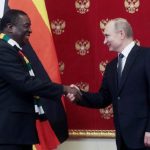Britain’s policy approach towards Zimbabwe has largely been driven for many years by sanctions whose purpose, laudable enough, has been to change behaviour away from all the kinds of gross abuses so clearly and ably set out in his speech by my noble friend Lord Oates. There have been and currently are gross abuses, with the illegal undermining of the opposition through abductions, torture and indeed murder, abuse of the legal system and corruption of the political system—not just at a lower level but, as my noble friend pointed out with his quotations, even from the vice-president—and dehumanisation and incitement at the highest level.
After these very many years I ask myself, as I ask the Minister, what is the purpose of our sanctions now? If all these abuses which have been described are continuing, do Her Majesty’s Government believe that the sanctions are going to resolve the problems we are discussing? I think not. Do they have a downside? Yes, they do. They portray Britain as an old colonial power that, decades on, remains insistent on sanctions that have not worked to change things for the better but which are seen, rightly or wrongly, by many—not only among supporters of the Zimbabwean Government—as contributing to the disastrous state of the Zimbabwean economy. At the same time it is clear that Russia, and even more especially China, have been engaging with countries in sub-Saharan Africa, such as Zimbabwe, and picking up support from them with no questions asked.
Partly as a result of that, and because of its own experience of sanctions, last month at the United Nations General Assembly we saw Zimbabwe refusing to back western sanctions against President Putin’s Russia, saying that it was opposed to them because they make complex situations worse. Instead of globalisation having broadened and deepened relationships across the world, we are now splitting into those who support Russia and China, which are the majority of states in the UN, versus those who support the United States and Europe, who may control the larger part of the global economy, at least for the present, but not necessarily the majority of the people or of the UN member states.
It seems that this requires post-Brexit Britain to review its approach to policy with Zimbabwe and other countries with which we have difficult historic relationships. In the context of Zimbabwe in particular, I would be grateful if the Minister and his colleagues would begin to review the effectiveness and value of sanctions and see whether there are other, better ways of bringing about the changes we all want to see. I appreciate that this would be a major shift of policy, and timing is of course a sensitive question too in all these things. So in addition, perhaps instead of excluding Zimbabwe from the Commonwealth we should be inviting it back, at least as a guest initially, perhaps to a CHOGM meeting, in the hope that rebuilding relationships within the Commonwealth might bring some positive peer pressure to bear and perhaps a better outcome than the sanctions, which to date have not achieved what we want.
17:00:00
Baroness Hoey (Non-Afl)
 My Lords, I welcome this short debate and congratulate my friend the noble Lord, Lord Oates, on his perseverance in getting it and on his excellent speech which outlined practically the whole short history of Zimbabwe. It is vital to raise awareness of what is happening in the deeply entrenched and long-lasting horror of the crisis in Zimbabwe. Particularly at the moment while the world is focused on the terrible tragedy of Ukraine, tyrants and dictators all over the world can get away with even more brutality, such as in Zimbabwe 2022.
My Lords, I welcome this short debate and congratulate my friend the noble Lord, Lord Oates, on his perseverance in getting it and on his excellent speech which outlined practically the whole short history of Zimbabwe. It is vital to raise awareness of what is happening in the deeply entrenched and long-lasting horror of the crisis in Zimbabwe. Particularly at the moment while the world is focused on the terrible tragedy of Ukraine, tyrants and dictators all over the world can get away with even more brutality, such as in Zimbabwe 2022.
Continued next page
(590 VIEWS)



Pingback: Zimbabwe tells Britain to mind its own business | The Insider